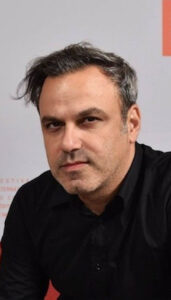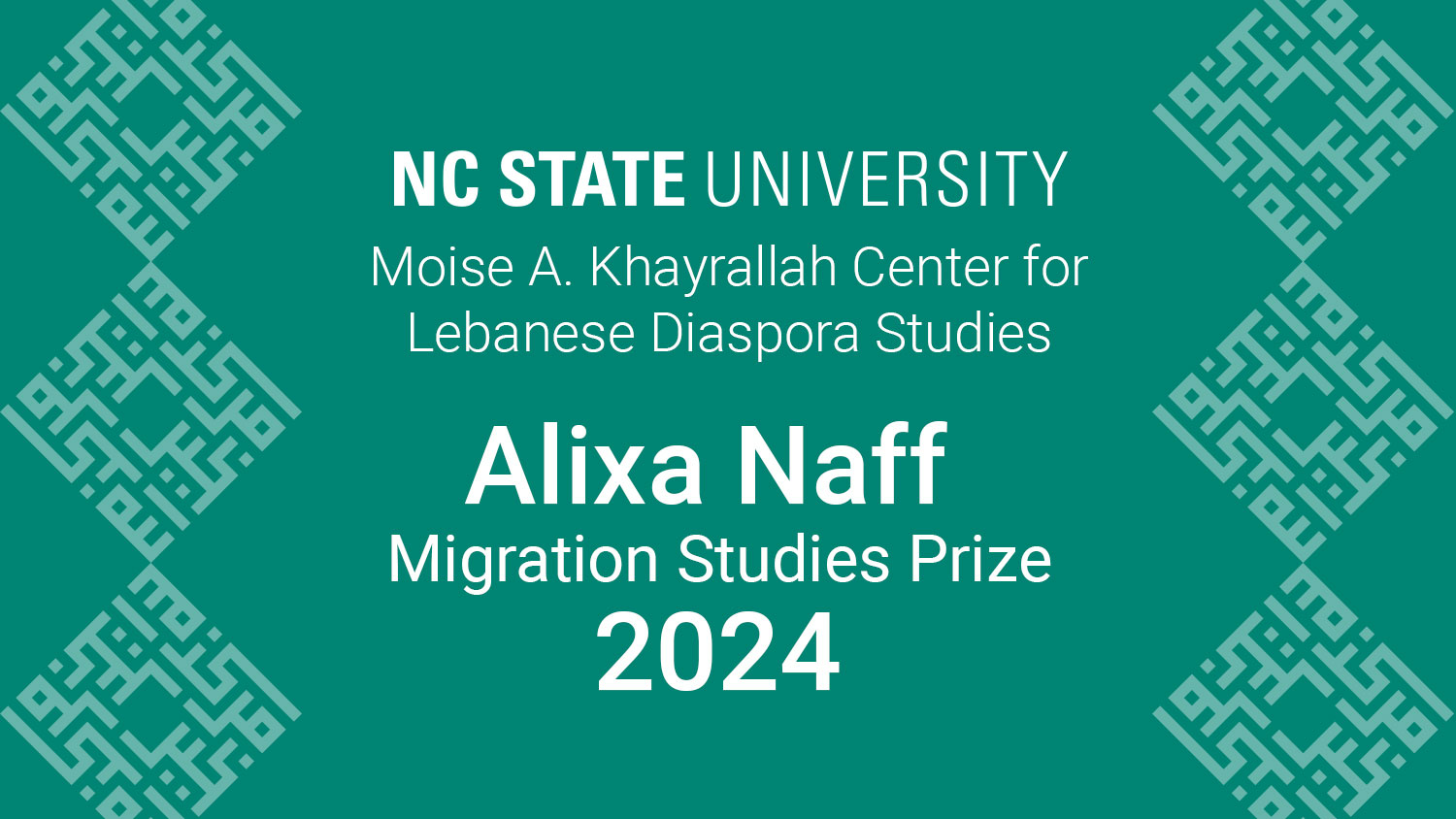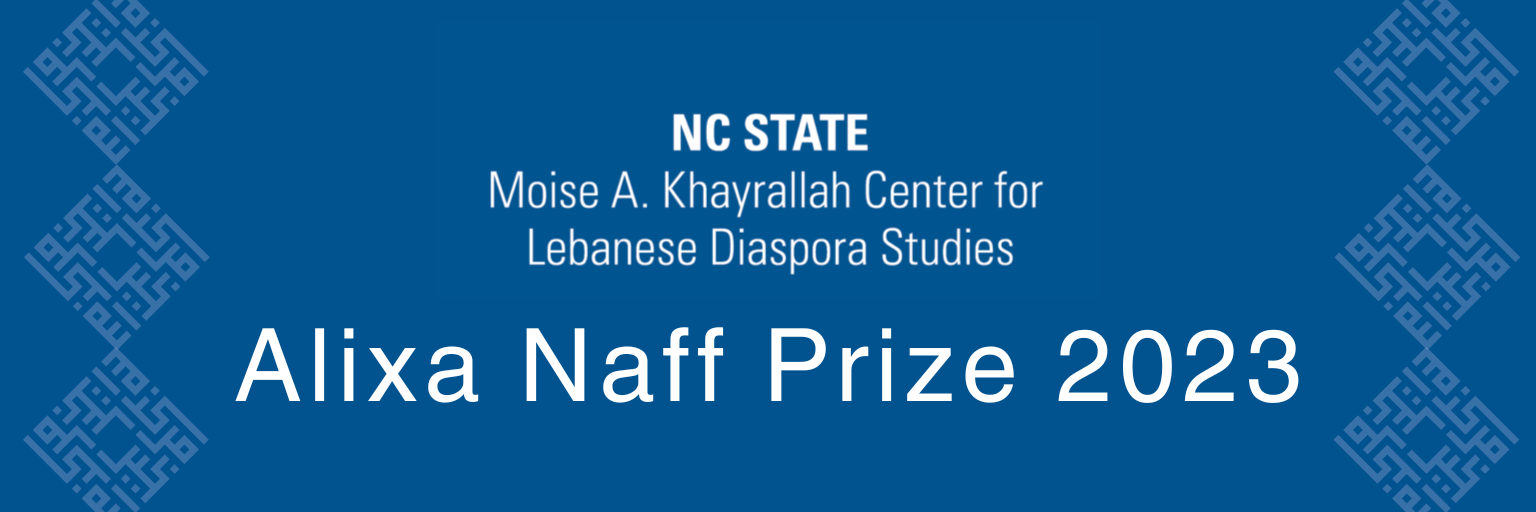Mohsen, Mouaness Win 2021 Khayrallah Prize
The Khayrallah Center is pleased to announce that the 2021 Khayrallah Prize was awarded to Ahmad Mohsen for his novel al-Sama’a layssat Ma’ana [Heaven is Not on Our Side], and Oualid Mouaness for his film1982. Each will receive a $5000 monetary award, for their groundbreaking work.
In its sixth year now, the Khayrallah Prize is an annual award given by the Moise A. Khayrallah Center for Lebanese Diaspora Studies based at North Carolina State University. The Khayrallah Prize identifies, awards and publicly honors those whose original artistic productions and projects focus on any aspect of life in Lebanon, or among Lebanese immigrants, whether in the past or present.
Co-Winner: Ahmad Mohsen
In announcing the winners, Dr. Akram Khater, Director of the Khayrallah Center, noted that the Khayrallah Prize selection committee was deeply impressed by the power of Mohsen’s novel Heaven is Not on Our Side in capturing the intertwined and painful history of Lebanon’s own civil wars, with that in Syria where some Lebanese fought, and the itinerant lives that criss-cross the histories of both. His ability to weave a narrative with multiple characters and voices in beautiful prose that found humanity amidst places and times when/where violence left a large swath of destruction, makes this novel a veritable tour de force. The novel asks a central question: why have many Lebanese engaged in wars (locally and abroad) across two generations? In providing a look at the intimate lives of some of these individuals from childhood to adulthood, he refuses to reduce the answer to those who carry a rifle. Rather, his novel elucidates how the violence of class inequality and patriarchy (manifested daily in social, cultural, religious, political and economic systems in Lebanon) are the root cause of wars, and are the mechanisms that produce individuals willing to kill. Without excusing their violence, he forces us to confront the larger and more historic problems that beset Lebanon. In narrating the human cost stretching across some 50 years and countless lives, the novel lays bare the infrastructure of oppression and violence, and it does so as a call for resistance and change.

Upon receiving news of the award, Ahmad wrote: “I was absolutely delighted when I was informed of the news! As someone who is deeply interested in the lives and conditions of the Lebanese people living outside Lebanon, I wanted to contribute to a discussion on immigration in all its dimensions and directions, both positive and negative. Shedding light on this debate, through literature in particular, strikes me as necessary and special work, especially in this difficult and critical period in the history of Lebanon. I thank the Khayrallah Center for helping to promote and advance this debate in the first place, and for recognizing my novel by awarding it this year’s Khayrallah Prize. I hope that in winning this prestigious award my novel will contribute to our national conversation about immigration and its impact on Lebanon.”
Watch interview with Ahmad Mohsen.
Co-Winner: Oualid Mouaness
Dr. Akram Khater, Director of the Khayrallah Center, noted that the Khayrallah Prize selection committee was deeply impressed by the power of Mouaness’ film 1982 in capturing the interplay between despair and hope, youthful dreams and adult anxieties, a Lebanon destroyed and a Lebanon imagined. The visual narration of an “ordinary” day in the lives of school kids and their teachers in Beirut on the eve of the Israeli invasion presents an engrossing microcosm of a nation unraveling, even as its children weave dreams that transcend the darkness of the moment. The story of a single day where the pubescent anxieties about budding love are intermixed with the sounds of Israeli jet fighters swooping to bomb Beirut creates a remarkable interplay of the lives of the inhabitants of Beirut who endured many such days. It is in the very poetics of the filming–imagery that captures this tension beautifully–that renders the film remarkable. The script, understated, is meant to lull the viewer into feeling in a real way the efforts of all to attain normalcy: end of the school year, dreams of summer vacations, and possible innocent liaisons. Yet, the uncertainty is ever present in the eyes of the teacher (played by Nadine Labaki), and through the sounds of jets and plumes of explosions. All this makes Mouaness first feature-length film a superb debut.

Upon receiving news of the award, Oualid wrote: “It’s an immeasurable honor to receive the Khyrallah Prize for my film ‘1982’. I’m humbled to be recognized among esteemed past laureates whose works speak so powerfully of home, memory and diaspora.” He adds: “Our roots, memories and stories continue to shape us no matter how far out into the world we travel and how far into the past they fade. In this film, I set out to narrate a fundamental facet of our undocumented and unuttered recent polemic history; the humanist one. This film opens up the necessary intergenerational discussions that must be had about Lebanon’s hard past and its impact on its present, so that perhaps we learn something and history can stop repeating itself.”
- Categories:


